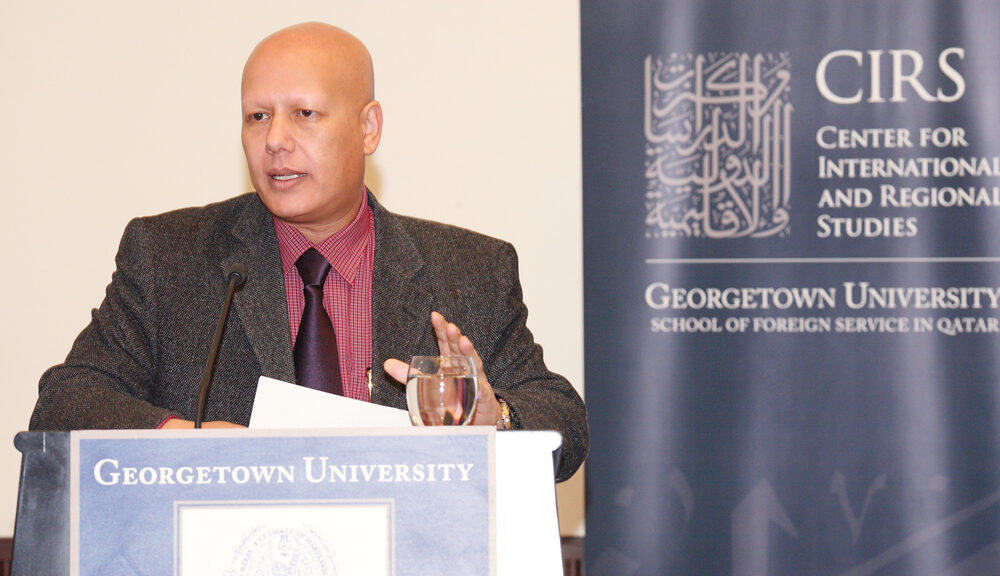Dr. Ahmad Sa’di Traces Israeli Policies of Control and Management of the Palestinian Population Throughout the 1950s and 1960s

The Center for International and Regional Studies (CIRS) at Georgetown’s School of Foreign Service in Qatar (SFS-Q) recently held an evening talk delivered by Dr. Ahmad Sa’di, senior lecturer in the Department of Politics & Government at the Ben-Gurion University of the Negev.
Co-author of Nakba with Lila Abu-Lughod, Dr. Sa’di has made waves within the Israeli academic community through his critique of policies enacted during the seminal years of the establishment of the state of Israel. His current project accesses previously unpublicized archives containing briefs, meeting minutes, memos and letters between Israeli legislators throughout the 1950s and 1960s.
“We are all very familiar with the Israeli population transfer policies of 1948,” Dr. Sa’di said, adding: “Less known are the methods and strategies used to sustain and expand this transfer. According to Shmuel Tolidano, longstanding adviser to the (Israeli) prime minister on Arab Affairs, his goals comprised the greater part of a memorandum he submitted to the government in 1973, which was adopted a year later as official policy. Moreover, it continued to constitute the basis of official policy until 1991.”
According to Dr. Sa’di, these principles included the prevention of the establishment of national and independent Arab organizations, the encouragement of ethnic and religious rifts, the linkage of basic necessities to the state, and the demographic containment of the Palestinian population within the borders established in 1948.
National and independent Arab political parties, Islamic organizations, economic enterprises including banks, labor unions, and chambers of commerce and social institutions such as sports clubs were all included in this approach. Paired with this control strategy was the policy of the ‘carrot and the stick’; the provision of preferential treatment to groups including Druze, Circassian and Greek Catholic minorities in order to splinter cohesion around a national Palestinian identity.
“The state should endeavor by all possible means to nurture in every ethnic and religious group particularistic interests,” recounted Dr. Sa’di. The linkage of basic necessities to the nascent Israeli state structure ensured Palestinian economic dependency and political disorder. Dr. Sa’di further explained, “This refers to the creation of conditions whereby individuals or collectives are compelled to compromise their political or moral beliefs to ensure their economic survival or material interests.”
With regard to demography, Dr. Sa’di noted, “The tactic of containing the Palestinian (population) … through the education of Arab women and the introduction of family planning notions to the Palestinians … represented a leap of thinking and elaboration relative to previous (policies).”
Another aspect of displacement during the last half of the twentieth century included the settlement of Bedouins in cities and the transfer of Israelis to villages, resulting in the gradual elimination of Bedouin livestock and agriculture and subsequent shift to wage labor in metropolitan areas. “Palestinians as a collective were to be incorporated into the periphery of the Israeli economy through various means.”
Zoning plans for villages were to be drafted resulting in the demolition of houses outside of the locality’s newly drawn boundaries. Finally, the demographic concentration of Israeli Arabs in areas including the Galilee and the Negev were to be disrupted through the dispersion of police compounds and civilian institutions throughout, hampering the “…territorial continuity of the Arab community…”
Following years of painstaking archival research, Dr. Sa’di is nearing the completion of his manuscript on this material, to be released later this year. The SFS-Q community was privileged to learn from these previously unpublished insights on early Israeli population management policies.
CIRS is a premier research institute devoted to the academic study of regional and international issues. CIRS sponsors a number of forums throughout the year facilitating dialogue and an exchange of ideas on a broad range of issues with the aim of engaging and enriching the university students and community.
Founded in 1789, Georgetown University is the oldest Catholic and Jesuit University in the United States. Today, it is a major student-centered, international, research university offering respected undergraduate, graduate and professional programs in Washington D.C., Doha internationally. The establishment of the Qatar campus in 2005 continues a long history of engagement in the Middle East.
Since 1919, the Georgetown University School of Foreign Service has devoted itself to educating the next generation of diplomats, global leaders and scholars. At the Doha campus, students have the opportunity to major in International Economics (IECO), International Politics (IPOL) or Culture and Politics (CULP).